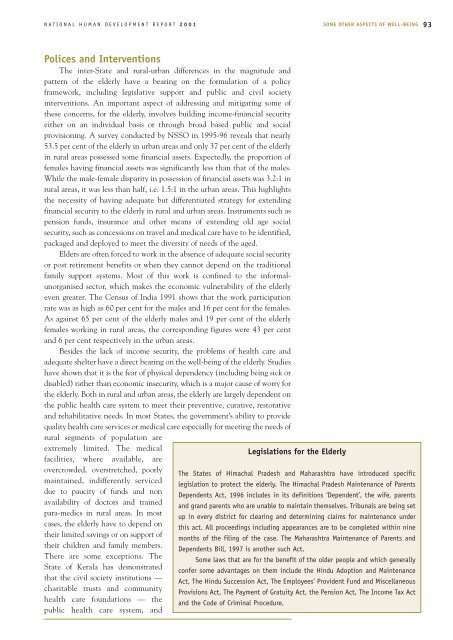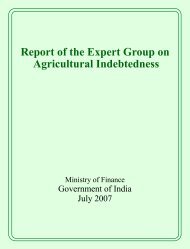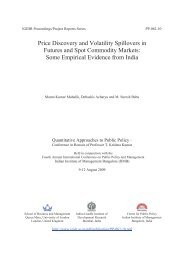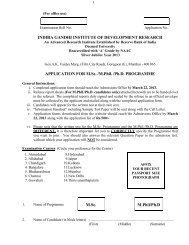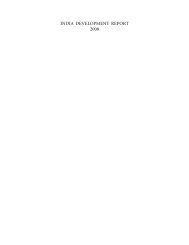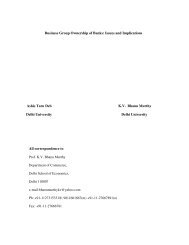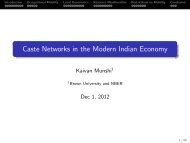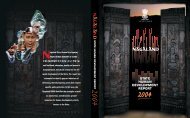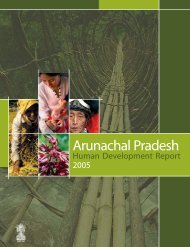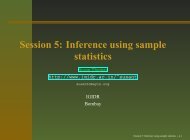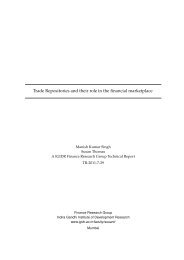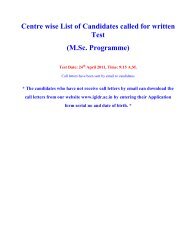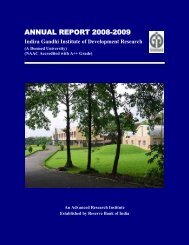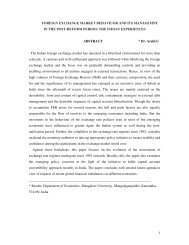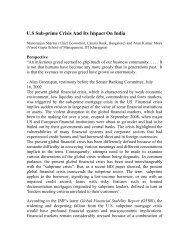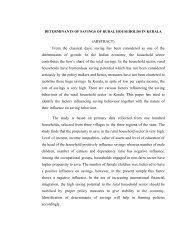National Human Development Report: 2001 - Indira Gandhi Institute ...
National Human Development Report: 2001 - Indira Gandhi Institute ...
National Human Development Report: 2001 - Indira Gandhi Institute ...
- No tags were found...
Create successful ePaper yourself
Turn your PDF publications into a flip-book with our unique Google optimized e-Paper software.
NATIONAL HUMAN DEVELOPMENT REPORT <strong>2001</strong> SOME OTHER ASPECTS OF WELL-BEING 93Polices and InterventionsThe inter-State and rural-urban differences in the magnitude andpattern of the elderly have a bearing on the formulation of a policyframework, including legislative support and public and civil societyinterventions. An important aspect of addressing and mitigating some ofthese concerns, for the elderly, involves building income-financial securityeither on an individual basis or through broad based public and socialprovisioning. A survey conducted by NSSO in 1995-96 reveals that nearly53.5 per cent of the elderly in urban areas and only 37 per cent of the elderlyin rural areas possessed some financial assets. Expectedly, the proportion offemales having financial assets was significantly less than that of the males.While the male-female disparity in possession of financial assets was 3.2:1 inrural areas, it was less than half, i.e. 1.5:1 in the urban areas. This highlightsthe necessity of having adequate but differentiated strategy for extendingfinancial security to the elderly in rural and urban areas. Instruments such aspension funds, insurance and other means of extending old age socialsecurity, such as concessions on travel and medical care have to be identified,packaged and deployed to meet the diversity of needs of the aged.Elders are often forced to work in the absence of adequate social securityor post retirement benefits or when they cannot depend on the traditionalfamily support systems. Most of this work is confined to the informalunorganisedsector, which makes the economic vulnerability of the elderlyeven greater. The Census of India 1991 shows that the work participationrate was as high as 60 per cent for the males and 16 per cent for the females.As against 65 per cent of the elderly males and 19 per cent of the elderlyfemales working in rural areas, the corresponding figures were 43 per centand 6 per cent respectively in the urban areas.Besides the lack of income security, the problems of health care andadequate shelter have a direct bearing on the well-being of the elderly. Studieshave shown that it is the fear of physical dependency (including being sick ordisabled) rather than economic insecurity, which is a major cause of worry forthe elderly. Both in rural and urban areas, the elderly are largely dependent onthe public health care system to meet their preventive, curative, restorativeand rehabilitative needs. In most States, the government’s ability to providequality health care services or medical care especially for meeting the needs ofrural segments of population areextremely limited. The medicalfacilities, where available, areovercrowded, overstretched, poorlymaintained, indifferently serviceddue to paucity of funds and nonavailability of doctors and trainedpara-medics in rural areas. In mostcases, the elderly have to depend ontheir limited savings or on support oftheir children and family members.There are some exceptions. TheState of Kerala has demonstratedthat the civil society institutions —charitable trusts and communityhealth care foundations — thepublic health care system, andLegislations for the ElderlyThe States of Himachal Pradesh and Maharashtra have introduced specificlegislation to protect the elderly. The Himachal Pradesh Maintenance of ParentsDependents Act, 1996 includes in its definitions ‘Dependent’, the wife, parentsand grand parents who are unable to maintain themselves. Tribunals are being setup in every district for clearing and determining claims for maintenance underthis act. All proceedings including appearances are to be completed within ninemonths of the filing of the case. The Maharashtra Maintenance of Parents andDependents Bill, 1997 is another such Act.Some laws that are for the benefit of the older people and which generallyconfer some advantages on them include the Hindu Adoption and MaintenanceAct, The Hindu Succession Act, The Employees’ Provident Fund and MiscellaneousProvisions Act, The Payment of Gratuity Act, the Pension Act, The Income Tax Actand the Code of Criminal Procedure.


